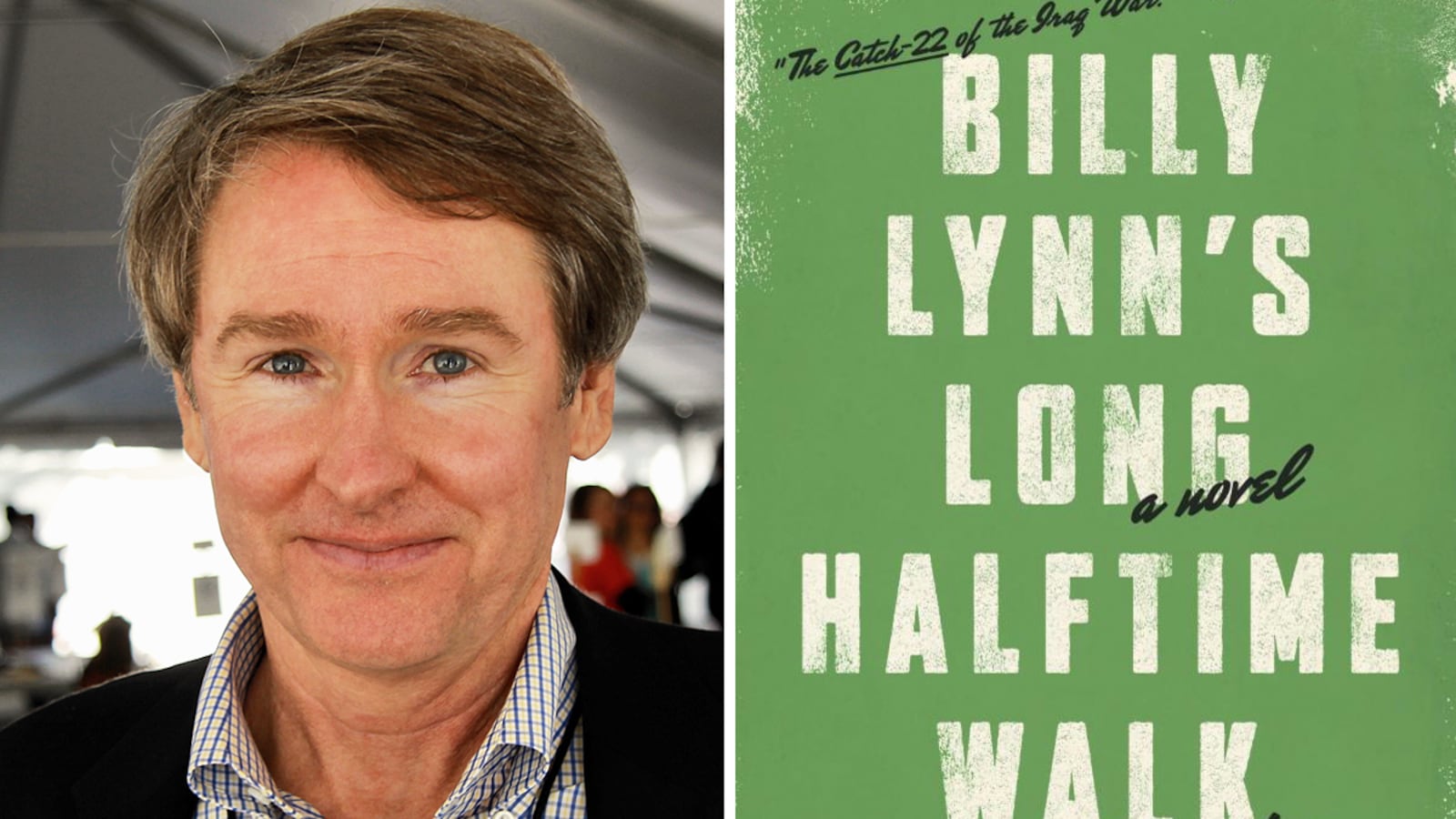The villain in Billy Lynn’s Long Halftime Walk, Ben Fountain’s novel about the Iraq War, is not Dick Cheney, Donald Rumsfeld, or George W. Bush (whom one character likens to “the nicest banker you’d ever hope to meet”). Nor is it Saddam Hussein, or Osama Bin Laden. The arch villain instead is Jerry Jones, the billionaire Texas oilfield titan and owner of the Dallas Cowboys. Fountain, perhaps on the advice of his lawyers, doesn’t use Jones’s name in the novel—he’s “Norm Oglesby”—but the resemblance is precise, down to the “ghostly cold-fission blue” eyes, the “famously nipped, tucked, tweaked, jacked, exfoliated mug,” and the “peach-tinted hair.” Every one of his features projects money; the same effect, notes Fountain, would be achieved by “plastering your face with thousand-dollar bills.” Norm is a symbol of implacable corporate power—preening, surgically perfected, casually domineering. He is, in other words, a symbol of America itself.

It’s difficult to think of a novel in the last decade more preoccupied with symbols of American power than Billy Lynn’s Long Halftime Walk, the entirety of which takes place on Thanksgiving Day during a game between the Cowboys and the Bears (Bears win, 31-7). Norm is hosting the eight surviving members of Bravo, an army squad back from Iraq on a brief “Victory Tour.” Two weeks earlier, Bravo’s exploits in something called the Battle of al-Ansakar Canal were broadcast on Fox News. For his heroics, one of the soldiers, Billy Lynn, has achieved a national celebrity on the magnitude of Jessica Lynch. But what exactly happened at al-Ansakar Canal is never fully explained; the details are as blurry to the reader as they are to the soldiers involved.
During their tour Bravo has been feted at the White House, appeared on local news shows in Phoenix and Omaha, and sat for interviews with countless local newspapers in Kansas City, Denver, St. Paul, and Pittsburgh—their itinerary, one soldier notes, is heavily weighted to electoral swing states. The final stop is Texas Stadium, where they have been asked to participate in a halftime celebration alongside Destiny’s Child.
It’s hard to tell whether the men of Bravo are more traumatized by the war or their media tour. They have traded one combat zone for another. The halftime show, especially, is a cacophonous display of shock and awe. Amidst Day-Glo strobe lights and fireworks that “sizzle like RPGs,” Beyoncé sings patriotic gobbledygook (“Soldja gonna be real fah me…/soldja gonna get chill fa me”), a marching band thumps bass drums, and dancers execute “jazzy kung fu moves.” One of the soldiers, shrinking from the aggressive ass gyrations of one dancer, begins silently to sob.
Looming over the action is the knowledge is that, within hours of the game’s conclusion, Bravo will be sent back to Iraq. This gives urgency to the various subplots: a Hollywood producer’s attempt to broker a film deal for Bravo; Billy Lynn’s temptation to desert the army and seek asylum with a pacifist pastor; and Billy’s frantic efforts to lose his virginity to a Jesus-loving Dallas cheerleader by the end of the game. The novel is pervaded by an eerie gallows humor—the soldiers are simultaneously haunted by their battlefield experiences, and haunting, for they, and everyone they meet, know that they might soon be dead. They are walking ghosts, like the soldiers on leave from World War I whom Proust described as visiting “from the shores of death, whither they would soon return.”
[They] came to spend a few moments in our midst, incomprehensible to us, filling us with tenderness and terror and a feeling of mystery, like phantoms whom we summon from the dead, who appear to us for a second, whom we dare not question, and who could, in any case, only reply: “You cannot possibly imagine.”
In Billy Lynn’s Long Halftime Walk the soldiers of Bravo constantly encounter strangers who are both awed and spooked by their presence. The fawning strangers ask questions like “What was it like…being shot at?” or “We can’t help wonderin’, weren’t you scared?” They say that they want to imagine what Iraq is like, but they don’t mean it. Whenever the soldiers actually tell the truth—when they describe war as “a state of pure sin” or proudly call themselves “murdering psychopaths”—they’re greeted with horror and even revulsion.
This brings us back to Jerry Jones, or “Norm Oglesby.” After the Hollywood producer fails to option the Bravos’ story to anyone in the film industry, Norm takes an interest. He sees potential in their story; he believes that a film about Bravo would “reinvigorate” a nation crippled by doubt about the Iraq War. And Norm should know. He is, after all, “a marketing genius,” who has become the most successful team owner in the history of American sports by elevating his franchise to the status of religious icon. “He is so completely certain of the Cowboys brand,” writes Fountain, “that God is surely on his side. What higher calling could there be?”
Norm understands the power of advertising, so he appreciates, even to a greater extent than the soldiers themselves, that the Victory Tour is nothing more than a carefully choreographed marketing campaign. The soldiers have not been enlisted merely to promote their own battlefield success, or even the success of the war effort. They are meant to promote a view of America as a powerful, strong, and prideful nation—“A Global Force For Good,” to quote the U.S. Navy’s own slogan. As soon as the soldiers veer off-message and talk about how they enjoy killing Iraqis, they alienate their employer and target audience: the American taxpayer. Norm hopes to focus their message, and amplify it. His film adaption will be a feature-length advertisement for American virtue.
What does all this have to do with football? Fountain, as might be expected, makes much of football as a martial metaphor. At one point Billy Lynn wonders why the government doesn’t send these athletes, “the best-cared-for creatures in the history of the planet” who represent “the very pinnacle of American innovation and abundance” to fight the war instead of Bravo:
Send them just as they are this moment, well rested, suited up, psyched for brutal combat, send the entire NFL! Attack with all our bears and raiders, our ferocious redskins, our jets, eagles, falcons, chiefs, patriots, cowboys…
But Fountain goes further, extending the metaphor beyond the game itself, to the business of the NFL. As Billy wanders around Texas Stadium, overwhelmed by “the barrage of sensory overload”—the incessant synth-and-bass pumped through the loudspeakers, the advertisements on the Jumbotron, the oversize banners and signs—it dawns on him that the game itself might ultimately be irrelevant. “Could it be that advertising is the main thing? And maybe the game is just an ad for the ads.”
Fountain’s novel leaves the reader wondering whether the war is maybe an ad too—one long advertising campaign intended to convince 311 million people that they have a common purpose. Or any purpose at all. War, whether simulated on a football field or broadcast on FoxNews, imposes a sense of direction, purpose, validation, even redemption. As the Hollywood producer puts it, when pitching Bravo’s story for film, “It gives us hope, we’re allowed to feel hopeful about our lives.” That message is lost on the soldiers of Bravo who, on the eve of redeployment, have no reason to feel hopeful about their lives. They reject Norm’s offer. They’ve sold their bodies, but they refuse to sell their souls.
Other notable novels published in 2012:
San Miguel by T. Coraghessan BoyleA Hologram for the King by Dave EggersThese Dreams of You by Steve EricksonCanada by Richard FordArcadia by Lauren GroffThe Devil in Silver by Victor LaValleThe Yellow Birds by Kevin PowersBuilding Stories by Chris Ware
Pulitzer Prize:No award.
National Book Award:The Round House by Louise Erdrich
Bestselling novel of the year: Fifty Shades of Grey by E.L. James
About this series:
This monthly series will chronicle the history of the American century as seen through the eyes of its novelists. The goal is to create a literary anatomy of the last century—or, to be precise, from 1900 to 2012. In each column I’ll write about a single novel and the year it was published. The novel may not be the bestselling book of the year, the most praised, or the most highly awarded—though awards do have a way of fixing an age’s conventional wisdom in aspic. The idea is to choose a novel that, looking back from a safe distance, seems most accurately, and eloquently, to speak for the time in which it was written. Other than that there are few rules. I won’t pick any stinkers.
Previous Selections:
1902—Brewster’s Millions by George Barr McCutcheon 1912—The Autobiography of an Ex-Coloured Man by James Weldon Johnson 1922—Babbitt by Sinclair Lewis 1932—Tobacco Road by Erskine Caldwell 1942—A Time to Be Born by Dawn Powell 1952—Invisible Man by Ralph Ellison 1962—One Flew Over the Cuckoo’s Nest by Ken Kesey 1972—The Stepford Wives by Ira Levin 1982—The Mosquito Coast by Paul Theroux1992—Clockers by Richard Price2002—Middlesex by Jeffrey Eugenides





